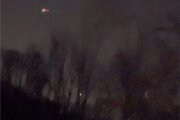UMAN, Ukraine (AP) — Prayer chants and the sounding of traditional ram’s horns fill the air in the town of Uman, in central Ukraine, as thousands of pilgrims join an annual gathering to mark the Jewish new year, despite the war against Russia.
Uman, 200 kilometers (125 miles) south of the Ukrainian capital Kyiv, is transformed for the celebration of Rosh Hashana. The streets are plastered with signs in Hebrew for the pilgrims who come to pray at the tomb of Rabbi Nachman, the great-grandson of the founder of Hasidic movement.
Despite Ukrainian and Israeli diplomats warning of the security threat, officials told The Associated Press that 35,000 pilgrims made the journey to Uman this year, the same as in earlier years.
Rabbi Moshe Reuven Azman, a leading figure in Ukraine’s Jewish community, was one of those who urged international pilgrims not to visit Ukraine due to security concerns but acknowledged that many would still make the trip regardless of the potential risks involved.
“Every year (since Russia’s full-scale invasion), I speak on Israeli television and radio, and I call on the (Jewish) pilgrims not to come to Ukraine. My primary concern is for the lives of people,” he said.
As the war in Ukraine rages for a third year, Russian army fires barrages of drones and missiles at Ukraine almost daily, leaving no region completely safe. Active combat is taking place along a 1,000-kilometer (620-mile) front, as Russian forces press their advantage in the eastern Donetsk region. This year alone, the Russian army has managed to capture several thousand square kilometers (miles) of Ukrainian territory, with the capture of the city of Vuhledar being their most recent notable achievement.
Nachman Shitrit, 18, who traveled to Uman from Haifa, Israel with his father, said he had made the pilgrimage over a dozen times.
“The war here didn’t scare me from traveling to Ukraine; there’s also war where I came from,” he told the AP.
This year’s pilgrimage comes at an increasingly volatile time in the Middle East. Israel is now engaged in a multifront war that includes the battles with Hamas in Gaza and Hezbollah in Lebanon, attacks from Iran and strikes inside Syria, plus ongoing confrontations with armed militants in the West Bank and occasional attacks launched by Iranian-backed militants in Iraq and by the Houthis in Yemen.
The hostilities posed additional challenges to some pilgrims travelling to Ukraine this year.
Ukraine closed its air space in February 2022, at the start of Russia’s full-scale invasion, forcing visitors to travel overland via other European countries in order to reach Uman.
The United Jewish Community of Ukraine said Wednesday that more than 14,000 pilgrims were unable to travel to Uman, partly as a result of Iran’s attack on Israel Tuesday. Iran fired a barrage of nearly 180 missiles, causing cancellation of multiple flights from Israel in an act Iranian officials called retaliation for Israel’s recent strikes on Hezbollah.
Meir Shpanier, 23, who travelled from Tel Aviv, said the difficulty of the journey had made the experience more meaningful to him this year.
“I managed to get here by a miracle. My travel agent booked airplane tickets from Tel Aviv to Budapest. From there, a Ukrainian driver picked me up, and we drove 22 hours to Uman. But some of my friends had to travel through five countries.”
“Because I had to work hard to get here, it means more to me now. I think we’re all blessed to be here,” Shpanier said.
Copyright © 2024 The Associated Press. All rights reserved. This material may not be published, broadcast, written or redistributed.






